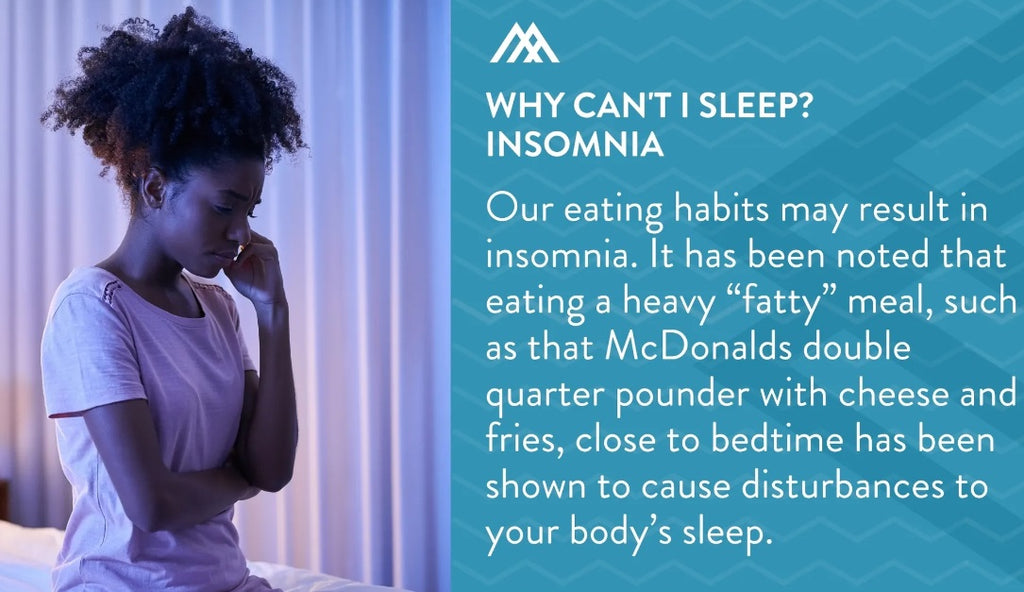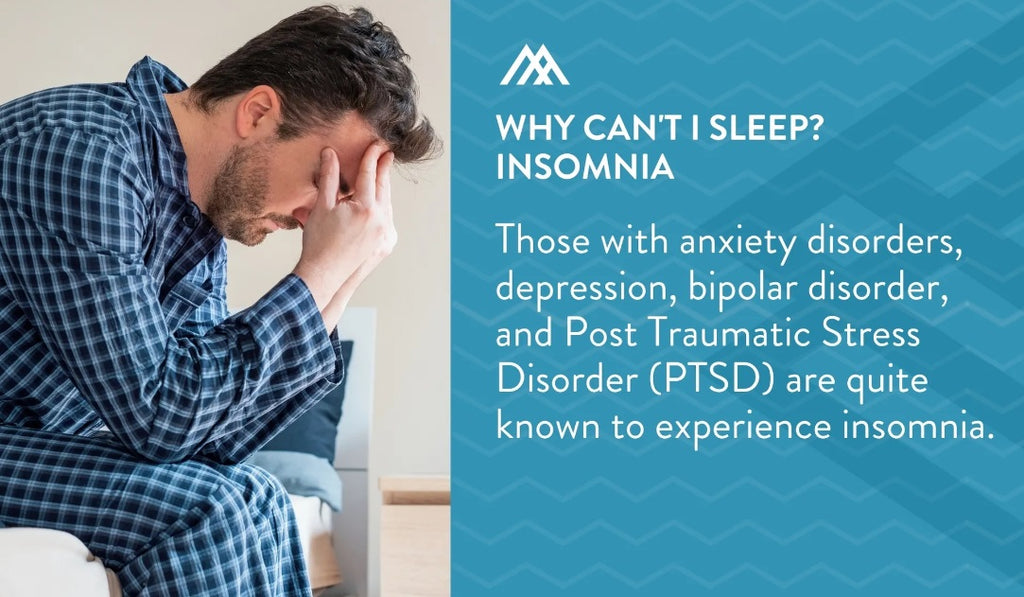Your Cart is Empty

January 28, 2021 8 min read
It is now 1:48 AM and I still cannot fall asleep. Yikes! A few more days of this and I’m going to consider myself a night crawler zombie. For the last two weeks, I have not been able to fall asleep, stay asleep, or get enough sleep to make me feel refreshed. The haze of the days just seems to flow one into another. Counting sheep does not do it for me anymore. All I know is that I better figure something out fast. Physically, how long can a person go without shutting down and getting that reboot that comes with a refreshing night’s sleep? My level of grumpiness is beginning to affect those around me. Typically, I am happy, jovial, and engaging. Now I cannot concentrate, yawn all throughout the day, and feel out of sorts. If this situation sounds like yours, you may be experiencing insomnia. I have heard friends and others discuss the term and condition of insomnia before, but what does it entail and what can be done about it? So why don’t we explore it together?

Insomnia is a type of sleep disorder in which one either cannot fall asleep or has trouble staying asleep. Sounds straightforward, doesn’t it? However, when we look more closely, we see that there are several different levels to this. To begin with, insomnia can be a temporary condition that goes away on its own, or it can be chronic, lasting a good while. Technically speaking, acute insomnia lasts from one night to a few weeks. Insomnia is considered chronic when it happens at least three nights a week for three months or more.
Additionally, there are two types of insomnia: primary and secondary. Primary insomnia means simply that there are no health-related issues causing your sleep disturbances. Secondary insomnia is where personal health issues are to blame. As with anything in life, I like to dive a little deeper and see where I fit into the picture. To do that, let’s look at what conditions underlie Primary and Secondary Insomnia.
Personally, I have found that many friends, family members, and clients fall into this category. Primary insomnia is where stress, changes in life, surroundings, and personal sleeping preferences are significant factors. Naturally, when the stress of life enters our world, many things are affected. A death in the family, changes in employment, going through a divorce, or moving into a new home are all things that can affect our normal sleep patterns. These life events change our thinking. Although it may be temporary, changes in our thought processes can alter how our bodies function. Adrenal glands in the brain produce more substances to deal with the issues at hand, hormones can become unbalanced, and our brains function in unfamiliar ways. These types of physiological changes challenge our minds and the effects show up in our sleep. It is natural for this to happen. Our bodies are simply adapting and functioning normally. When we finally come to peace with such stressors, our sleep should return to normal.
Changes to your personal sleep pattern can bring on insomnia. Activities such as traveling to a different time zone, commonly called jet lag, can jump start sleep issues. Other things like changing your work hours and/or acquiring bad sleeping habits during other times you had sleep issues can bring about the disorder of insomnia.
Furthermore, changes to your sleep environment can cause insomnia. Someone who likes to sleep in a dark room with a fan running for background noise may experience sleep disturbances if a new sweetheart can only sleep with the television on. Perhaps your new mattress does not feel broken in as you like it yet. We all know these kinds of situations.

Our eating habits may result in insomnia. It has been noted that eating a heavy “fatty” meal, such as that McDonalds double quarter pounder with cheese and fries, close to bedtime has been shown to cause disturbances to your body’s sleep. I know this one all too well. I am your typical late eater who retires to bed after consuming pasta and cookies for dessert!
There is a lot of data indicating that the use of electronics, such as an iPad, laptop, or cellular phone, in bed can affect your brain in a negative way where sleep is concerned. While I am not quite sure how this happens, I can say that when I roll over and look at my phone in the middle of the night, the light alone wakes me right up.
Finally, it is only right that we should discuss the COVID-19 situation and how it has affected our sleep. Since this crisis arose, many of us have been introduced to new ways of living, not to mention the stress associated with the COVID-19 virus. We are working more from home or doing our school work from the comforts of our bedrooms. This has increased the rate of insomnia cases across the world let alone our country. When we are used to a routine of getting up in the morning, taking that shower, and driving to our school or job site, we might have become conditioned to that lifestyle. Our bodies naturally expect us to sleep at whatever time would have been normal after our regular routine. Since the big changes of late, we have the opportunity to skip that shower, save a little gas money, and sit doing our work with the comforts of our covers and PJ’s.

Even though this may sound like a dream-come-true to those home-bodies out there, it can have a crucial effect on our natural sleeping pattern. Instead of using our sleeping quarters just for sleeping, they have now become our offices or our classrooms. Our body-and-mind’s association between our bedroom and sleep has been broken. We no longer have a symbolic escape from the office or school as it seems to us that, even as we turn off the light, we are still at the office or school. If it’s possible, try to set up your office/classroom as a non-bedroom. If not, try to think of ways to easily switch back and forth, such as having certain lights, music, or smells that you use only during the day or only at night. Perhaps use a fluorescent light during office time and a soft, incandescent light in the evening. Or at the end of office/school time, switch on your favorite music, light your favorite scented candle, or spritz the room with your favorite essential oil. These small things will help your body/mind switch from day mode to night mode and may aid you in getting a better night’s sleep.

When our talk switches to secondary insomnia, we look at general health issues. Conditions like asthma, chronic pain, cancer, arthritis, sinus issues, digestive issues including heartburn, and, of course, sleep apnea may wreak havoc on our sleep. However, health issues are not just limited to physical conditions. Those with anxiety disorders, depression, bipolar disorder, and Post Traumatic Stress Disorder (PTSD) are quite known to experience insomnia. In fact, many of those who struggle with mental health issues will include insomnia as a key factor in their own personal treatment plans. Physical and mental health issues often come with medications to deal with the symptoms. Medications that we take during the day to alleviate the physical or mental challenges we face can have negative effects on our cycles as we try to unwind. I remember being on prednisone steroid for Crohn's and Ulcerative Colitis flare ups during the day. This did help the cramps and other elements I was dealing with, but when I tried to fall asleep at night my eyes bugged out as if I were ready to start a whole new day. Many medications can have sleep disturbing side effects. It is always smart to talk to your prescribing doctor about any medications and what steps you can personally take to mitigate these side effects.
Insomnia is very widely known. Most people will experience at least one bout of insomnia once in their life. This is good because there are many treatments out there that have a great success rate.
As a former mental health therapist, I’ve engaged clients in stress reduction through Cognitive Behavioral Therapy. In therapy, clients begin to ease the tensions they experience which helps them have a better night’s sleep. Furthermore, I am a strong advocate for meditation, exercising during the day, and changing habits surrounding one’s sleep. You can listen to guided meditations free on your phone or iPad’s, take a walk during the day, and make your sleep area primarily for sleep. I prefer listening to a thunderstorm or windstorm in my dark sleeping arena.
Also, we all have been down those grocery store aisles with the dizzying array of over-the-counter medications. Unisom, Nyquil, ZZZZquil, Melatonin, Sleep Aides with or without pain relief, and supplements like Collagen are there to assist you in getting back into your normal sleeping schedule. Just like everything else in life, there is no one-size-fits-all, but they can be a good way to jump start a new sleeping routine. I recommend Collagen because of the antioxidants it produces and the calming effect it has. Naturally, do some research and consider consulting your family health provider before beginning any new regimen.
Consulting a physician about prescription medications is another option we all have. Xanax, Temazepam, Ambien, and even low dosages of Trazadone may assist you if your insomnia has become chronic. At one point or another, I have utilized many of these medications. They do work. However, one should use caution because the long-term side-effects might outweigh the immediate benefits. It’s not uncommon for people to become hooked on sleeping pills, which may create an additional problem far worse than disruptions to your sleep. These medications are definitely something to discuss with your doctor.
For those whose sleep has been interrupted by the COVID-19 crisis, here are some good tips to follow; they may seem simple, but are easier said than done:
There is never one treatment that works specifically for everyone. It is a trial and error process that can be very frustrating. Knowing that your sleep is off and understanding how it is affecting your life can be immensely powerful knowledge. Give yourself time and care because it will not change overnight, so to speak. Be patient in getting back into the land of dreams and refreshing sleep. Find what is comfortable and works for you. Good luck!
Acute insomnia lasts from one night to a few weeks.
Insomnia is considered chronic when it happens at least three nights a week for three months or more.
Take our quiz and find which supplements your body is craving.

It has been noted that eating a heavy “fatty” meal close to bedtime has been shown to cause disturbances to your body’s sleep.
Our body-and-mind’s association between our bedroom and sleep has been broken, since the bedroom has also become the office or classroom.
Those with anxiety disorders, depression, bipolar disorder, and Post Traumatic Stress Disorder (PTSD) are quite known to experience insomnia.

January 23, 2026 8 min read
Read More
October 17, 2025 8 min read
Find out why creatine is better for vegans! Boost your wellness game and unlock peak performance with Amandean's premium supplements today.